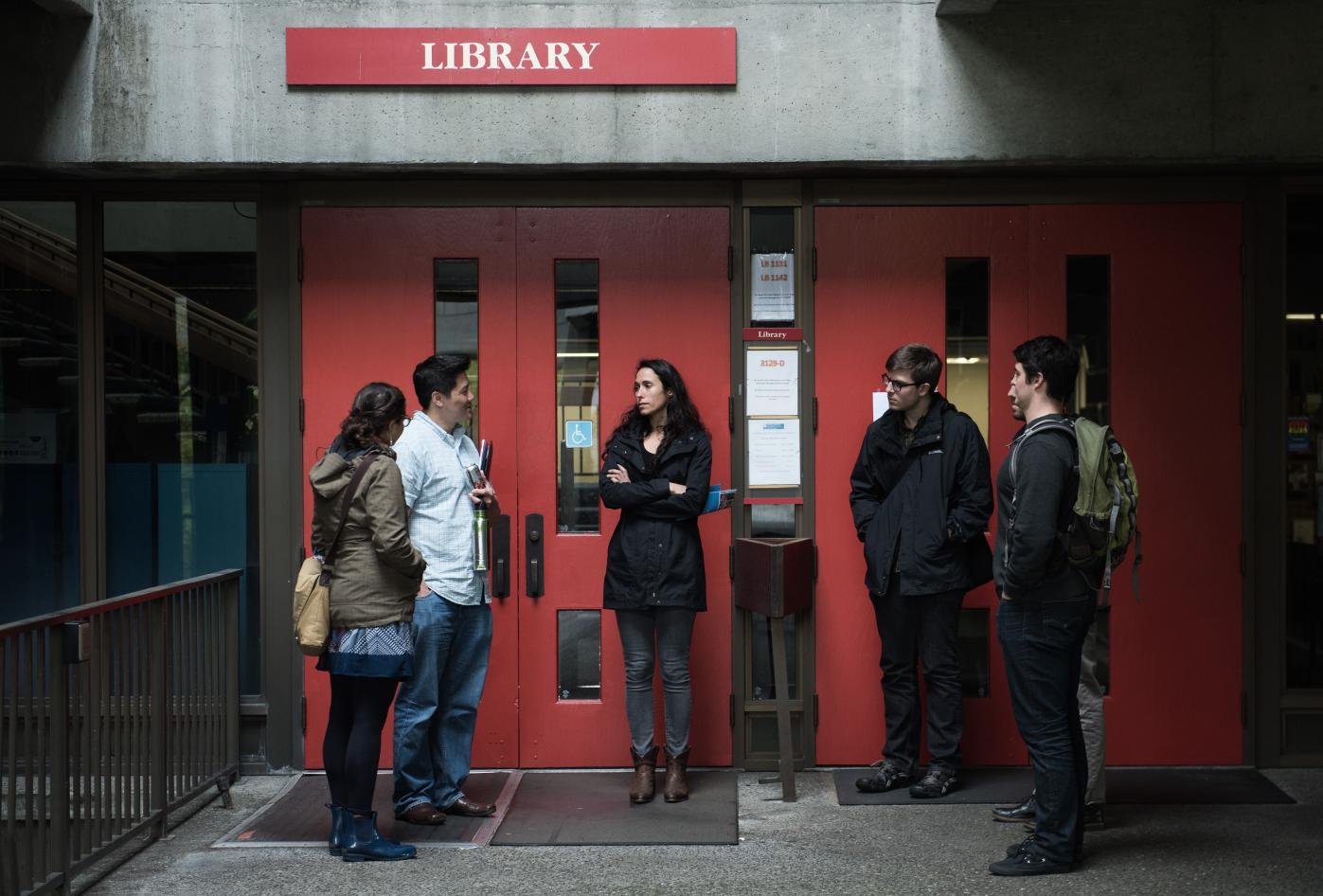
When candidates come from R1 schools, during the interview, they will often talk exclusively about research. As impressive as it is, we want to hear how good of a teacher you are. Can you reach diverse populations? Teach in a pedagogically sound way? Committees care about research, but we want candidates to be concise and focus on teaching.
For most doctoral candidates and recent PhDs, summer is often dedicated to preparing for the fall job market. In addition to drafting dissertation chapters and finally getting to those languishing revise and resubmits (alongside often precarious forms of summer employment), future job seekers are busy requesting letters of recommendation, polishing CVs, and wrestling descriptions of their teaching, research, and service into cover letters, teaching portfolios, and research statements that will, hopefully, land them a job.
But what kind of job?
In the face of a highly competitive job market, most candidates find themselves applying for a wide range of positions, from tenure-track jobs and postdoctoral fellowships at research universities to more teaching-intensive tenure-track positions at liberal arts and community colleges. Unfortunately, one set of job materials seldom works for all of the above. Still, job seekers tend to focus all their energy on and receive the most support for crafting materials for research-focused jobs, only to hastily copy and paste together materials for teaching-focused positions at the eleventh hour.
But as those in attendance at a recent University of Washington workshop on preparing community college job materials learned, that’s a sure way to land yourself in the rejection pile. The workshop was part of the Simpson Center for the Humanities’ Reimagining the Humanities PhD and Reaching New Publics program, a Mellon-funded initiative focused on transforming doctoral education, in part by familiarizing Mellon Fellows for Reaching New Publics in the Humanities with the community college context. As community college positions become increasingly competitive—a single job easily draws 200 applications—it’s important for job seekers to understand the differences, both big and small, not only between institutions but also between the materials they’re crafting for research jobs and the ones they’ll be submitting for teaching-focused positions.
Here are a few tips on how to impress the community college search committee:
1. Read the job description carefully. This may seem obvious, but Jim Jewell (English, North Seattle College), who recently sat on the search committee for a tenure-track position in his department that drew over 170 applications, says it’s striking how often candidates don’t submit every item requested. “Make sure you know exactly what the requirements are,” he says. He also advises using the job description as a guide for organizing your cover letter.
And don’t forget to fill out the application form in its entirety. While the CV you submitted may include all the information the application form asks for, search committee members often find it easier to cull incomplete applications before even opening eligible candidates’ files.
2. Your cover letter should be all about your teaching. Dr. Cristóbal Borges (History, North Seattle College) says that the main thing he looks for in a candidate’s cover letter—beyond making sure “it’s addressed to us”—is that it centers your teaching. While touching on your research is fine, he says, you should only do so in a way that speaks to how your research informs your teaching. Scrap your paragraphs on your dissertation and publication plans and instead focus on showing the committee how you teach and how your teaching complements the culture of the school to which you are applying.
3. Tailor your cover letters. Jewell says it’s important to show the committee that you understand who the college serves and how you’ll do the same. “Show us in the letter that this is not a copy and paste job, but that you’ve researched the school. Explain to us why you want to teach here. Speak to our location, population, courses, etc.”
Anthony Ferrucci (Philosophy, South Seattle College) agrees. “The last committee I was on, many of the letters we received seemed very generic. It takes ten minutes on Google to find information about schools. Then, you want to talk about that specific programming and how you can be part of it.”
Scott Ku (Communication, North Seattle College) says it’s also worth paying attention to the school’s demographics and then speaking to how you can serve that population in your letter.
“Do the leg work to figure out what our population is about and show us how you’ll be student-focused and how the student population will be your priority when you get here. It sends a big message when you do that, and an even bigger when you don’t,” Borges adds.
4. Craft a teaching-focused CV. During the workshop, participants asked about the convention of community colleges asking for resumés instead of CVs. Dr. Jaime Cárdenas’s (History, Seattle Central College) answer: the more information, the better, so send along a CV, even if they ask for a resumé. The trick, however, is not to send along the same CV you would for a research job, says Cárdenas, who likes to read the CV before the rest of an applicant’s materials. “The CV should know its audience,” Cárdenas says. “Put teaching experiences first, followed by your work in the community and conference-related activity, and then get into research experiences last.”
5. Consider sending letters of recommendation from your students. Because your students will be the central focus of your work at a community college, sending along letters of recommendation written by former students is highly encouraged. Not only does it illustrate the actual experiences students have had in your class, but it also shows how you’ve built personal connections with them. “Students are often very enthusiastic when asked to write you a letter, because it recognizes that they are a really important part of the process.”
But how do you solicit strong letters from students? Jewell suggests providing them with a brief description of what the letter should express and/or provide a boilerplate. You want to illustrate the genre without overcoaching them.
6. Make sure your job materials speak to each other. Borges says your application materials should work together purposefully and holistically. If you say something in your cover letter, make sure it’s backed up by your CV and your teaching philosophy. “Often we see applications where there’s a mechanical method of presenting information about who you are, but the parts don’t all equate to a whole person,” Borges says. “Sometimes I’ll finish reading a cover letter and I still won’t know who the candidate is. Think about how all your materials work together. That helps your application stand out.”
7. Like your job materials, the interview is all about your teaching. After working through a pile of 200-plus applications, the search committee has decided you are one of eight candidates it’ll invite for an interview. “When we get to the eight people we’re actually going to call, there’s not a lot of difference in quality, so the performance in the interview matters hugely. You have to win us over again.”
But how do you do that? Practice. Practice talking about your teaching with anyone who will listen. Be sure you have clear and concrete anecdotes about your time in the classroom—about moments you shined and moments you didn’t—and be prepared to discuss how you learned from your mistakes and how your teaching has evolved. By prepared to speak to how you will serve the student population, pulling specific examples from relationships you’ve built and courses you’ve developed.
And whatever you do: don’t talk about your research. “When candidates come from R1 schools, during the interview, they will often talk exclusively about research. As impressive as it is, we want to hear how good of a teacher you are. Can you reach diverse populations? Teach in a pedagogically sound way? Committees care about research, but we want candidates to be concise and focus on teaching,” Ferrucci says.
8. Prepare a solid teaching demonstration. Rather than a job talk, the heart of the campus interview at a community college is the teaching demonstration, which can run anywhere from 15 to 30 minutes. This is where you get to show the committee how you actually teach and engage students.
Cárdenas warns that the problem with a lot of teaching demonstrations is that candidates try to do too much—from covering too much material to including too many activities. “Don’t try to do too much, because you might end up rushing through some stuff that we think is fundamental,” he says. “It’s also super important that you leave time for questions from the committee.”
To that end, Cárdenas suggests picking one key concept to teach and then teaching it in a way that encourages active learning, making it as personalized and applicable to the “real world” as possible. “Do an activity, show us how you interact with students,” he says.
Aside from trying to cram in too much information or too many activities, Cárdenas also reminds candidates to steer clear of jargon. “You want to tailor your teaching to a 9th grade reading level, and if you do bring jargon in, really spend time with it. For example, you could build an entire demo around the word ‘territoriality’—work with students to unpack it and then engage it in an activity that asks students to apply it to their lived experiences.”
Above all, be careful not to tell the committee how you’d teach—show them. It’s ok to do some set up—talk about what the homework for class would be and how the class fits into the larger course design. But be careful not to simply walk the committee through what you might teach. “You need to show us your stuff,” Cárdenas says.
